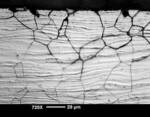Certification and Testing FAQs

Rotational Capacity Tests
Which bolts require a rotational capacity test?The rotational capacity test, sometimes referred to as a ROCAP test or RC test, serves as a quality control measure against excessively over-tapped nuts, a material with insufficient ductility, and generally assures that the assembly of elements (bolt, nut, and washer) will function together as a unit to achieve the required preloads. The test intends... Read more

ASTM vs SAE
What is the difference between ASTM and SAE Fastener Standards?When looking at a bolt specification, you may notice that some are ASTM standards, such as ASTM F1554, and some are SAE standards, such as Grade 5 (a common bolt found within the SAE J429 specification). Outside the technical differences (mechanical requirements, chemical requirements, and other requirements) that vary between any fastener standard, the difference... Read more

Intergranular Corrosion Test
What is an intergranular corrosion test?In order to answer this question, we must first define what intergranular corrosion is. It is a type of corrosion where the grain boundaries of crystallites in austenitic steel are more susceptible to corrosion than the inside of the material. Grain boundaries can become depleted during the manufacturing of stainless steel round bar, the hot... Read more

Certificate of Materials Origin (CMO)
Does Portland Bolt provide CMOs for state DOT projects?Yes, Portland Bolt will provide CMO paperwork for DOT projects in the US. The purpose of a CMO is to document the origin of materials used on a construction project. A CMO is required under the Buy America Act and applies to all federally funded highway construction projects. A CMO is used to certify that all... Read more
J429 Strength Requirements
Why are larger grade 2 and grade 5 bolts less strong than smaller diameter bolts?The reason is similar but different for the drop in strength of grade 2 and grade 5 fasteners. For J429 grade 2 fasteners, the drop is due to the manufacturing process. Small, mass produced cap screws are cold formed by drawing and forming wire. The wire, as it is cold formed, work hardens which increases... Read more

A325 Testing
Is rotational capacity testing required for A325 bolts?Rotational capacity testing is a test “intended to evaluate the presence of lubricant, the efficiency of lubricant, and the compatibility of assemblies.” The test is intended primarily for galvanized fasteners and fasteners that must be fully tensioned in structural applications. With A325 bolts now falling under the new F3125 specification, which covers high strength structural... Read more
Charpy Testing
What is Charpy Testing and what ASTM standards require it?Charpy testing, or impact testing was developed in 1905 by Georges Charpy in order to determine the amount of energy absorbed by a material during fracture. It was noticed that as the temperature drops, the tensile and yield of steel increases, but the ductility drops, leading to brittle and sometimes catastrophic failures. A standard Charpy... Read more
SAE Grade Markings
What are the grade marking requirements for SAE rods or studs?Answer: SAE J429 is a Society of Automotive Engineers specification for bolts covering “the mechanical and material requirements for inch-series steel bolts, screws, studs, sems1, and U-bolts used in automotive and related industries in sizes to 1-1/2 in inclusive.” From SAE J429 regarding studs: “The term ‘stud’ as referred to herein applied to a cylindrical... Read more

Proof Load for Large Nuts
What is the proof load rating for a large diameter (2-1/2”+) nut?Nuts that are over 2-1/2” diameter do not require a proof load test because most testing equipment in the industry is not large enough to test them effectively. In these cases, a hardness test is an acceptable alternative, unless a proof load test is specifically required by the buyer. Nuts this large would require in... Read more
ANSI B18.2.1
What is ANSI B18.2.1?Often times, ANSI (American National Standards Institute) or ASME (American Society of Mechanical Engineers) B18.2.1 will show up on a drawing, some certification documents, and even our website . This number simply refers to dimensional standards for a variety of common bolts, such as hex bolts, heavy hex head bolts, and square head bolts. Most... Read more
